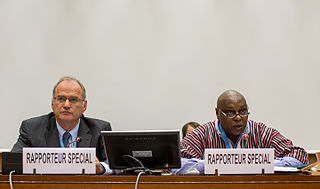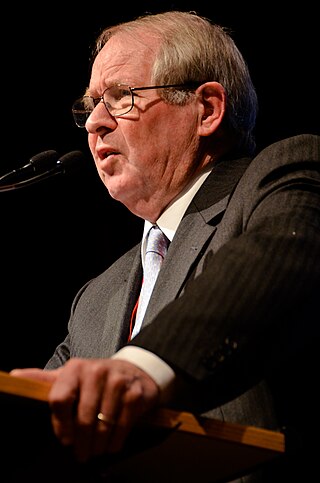
The United Nations Human Rights Council (UNHRC) is a United Nations body whose mission is to promote and protect human rights around the world. The Council has 47 members elected for staggered three-year terms on a regional group basis. The headquarters of the Council are at the United Nations Office at Geneva in Switzerland.

Special rapporteur is the title given to independent human rights experts whose expertise is called upon by the United Nations (UN) to report or advise on human rights from a thematic or country-specific perspective.

Christopher John Robert Dugard is a South African professor of international law. His main academic specializations are in Roman-Dutch law, public international law, jurisprudence, human rights, criminal procedure and international criminal law. He has served on the International Law Commission, the primary UN institution for the development of international law, and has been active in reporting on human-rights violations by Israel in the Palestinian territories.

Ahmed Shaheed is a Maldivian diplomat, politician and professor. On 24 March 2016, he was appointed for the sixth year running as the United Nations Special Rapporteur on the human rights situation in the Islamic Republic of Iran. Shaheed is also the Chairperson of the Geneva-based international human rights think-tank, Universal Rights Group, which was launched in January 2014. He now lives in England as a Professor of Human Rights Practice at the University of Essex. Shaheed is also a Senior Fellow at Raoul Wallenberg Human Rights Centre and a Fellow at the Bonavero Institute of Human rights at the Oxford university of Law.

David Richard Boyd is a Canadian environmental lawyer, activist, and diplomat. He was the United Nations Special Rapporteur on human rights and the environment until 2024.

The Yogyakarta Principles is a document about human rights in the areas of sexual orientation and gender identity that was published as the outcome of an international meeting of human rights groups in Yogyakarta, Indonesia, in November 2006. The principles were supplemented and expanded in 2017 to include new grounds of gender expression and sex characteristics and a number of new principles. However, the Principles have never been accepted by the United Nations (UN) and the attempt to make gender identity and sexual orientation new categories of non-discrimination has been repeatedly rejected by the General Assembly, the UN Human Rights Council and other UN bodies.
Pablo de Greiff is a Colombian academic and human rights activist, who served as the first United Nations Special Rapporteur on the promotion of truth, justice, reparation and guarantees of non-recurrence. In January 2015 he was also asked to be part of UNIIB, a United Nations mission of Independent Experts to address the situation in Burundi. From 2019 to 2020 he was part of a group of experts advising the UN Human Rights Council on its preventive functions. In April 2022 he was appointed as one of the three commissioners in the Independent Commission of Inquiry on Ukraine established by the UN. Since 2014 he is a Senior Fellow at the Center for Human Rights and Global Justice of the School of Law at New York University, where he directs both the Transitional Justice Program and the Prevention Project.
The Special Rapporteur on the Right to Food is a Special Rapporteur appointed by the United Nations, who reports on the right to food. The mandate was established in 2000 by the former Commission on Human Rights which appointed the first Rapporteur, Jean Ziegler. In 2008 the second Rapporteur, Olivier De Schutter, was appointed by the United Nations Human Rights Council, the successor to the Commission. In 2014 the third Rapporteur, Hilal Elver was appointed. In 2020, the current Rapporteur, Michael Fakhri, was appointed.
The United Nations Independent Expert on the Promotion of a Democratic and Equitable International Order is a United Nations Independent Expert appointed by the United Nations Human Rights Council under its special procedures mechanism, to report on the thematic field of the promotion of a democratic and equitable international order. The mandate was established by Human Rights Council resolution 18/6, chiefly supported by developing countries.
The Republic of Uruguay is located in South America, between Argentina, Brazil and the South Atlantic Ocean, with a population of 3,332,972. Uruguay gained independence and sovereignty from Spain in 1828 and has full control over its internal and external affairs. From 1973 to 1985 Uruguay was governed by a civil-military dictatorship which committed numerous human rights abuses.

Maina Kiai is a Kenyan lawyer and human rights activist who formerly served as the United Nations Special Rapporteur on the rights to freedom of peaceful assembly and of association from May 1, 2011, to April 30, 2017. Since 2018, he has headed Human Rights Watch's Alliances and Partnerships program.

Agnès Callamard is a French human rights activist who is the Secretary General of Amnesty International. She was previously the Special Rapporteur on extrajudicial, summary, or arbitrary executions appointed by the United Nations Human Rights Council, and the former Director of the Columbia University Global Freedom of Expression project.
The United Nations Special Rapporteur on the situation of human rights in the Islamic Republic of Iran is a United Nations Special Rapporteur whose mandate is to monitor and investigate human rights violations in Iran. The current Special Rapporteur is Javaid Rehman. He is the sixth special rapporteur to Iran, following the tenures of Andrés Aguilar (1984–1986), Reynaldo Galindo Pohl (1986–1995), Maurice Copithorne (1995–2002), Ahmed Shaheed (2011–2016), and Asma Jilani Jahangir (2016–2018).

Michel Forst is a French national actively involved in the defence of human rights. Former Secretary General of the French national human rights institution, he was the United Nations Special Rapporteur on the situation of human rights defenders from June 2014 to March 2020.
Saleh al-Ashwan is a member of the Saudi Civil and Political Rights Association, an organization that has advocated for the release of political prisoners and greater respect for human rights in Saudi Arabia and that was banned in March 2013. Saudi authorities arrested al-Ashwan in July 2012 for defending women's rights and held him without trial or access to lawyers for nearly four years, while confiscating his electronic devices. During his first two months of detention he was held incommunicado and Saudi activists allege that he was tortured, beaten, as well as stripped and suspended by his limbs from the ceiling of an interrogation room. In 2016 a Saudi court sentenced al-Ashwan to five years in prison and a five-year ban on travel abroad. He is currently held in al-Ha’ir prison south of Riyadh. Due to these abuses, he is considered to be a prisoner of conscience by Amnesty International.

The post of Special Rapporteur on Minorities has been created as minorities in all regions of the world are exposed to serious threats, discrimination and racism and are often excluded from participation in economic, political and social life. It shall provide for the implementation of the Declaration on the Rights of Members of National or Ethnic, Religious and Linguistic Minorities, taking into account existing international norms and national minority laws.
Stanley Michael Lynk is a Canadian legal academic. He is currently an associate professor at the University of Western Ontario. From 2016 to 2022 he was the Special Rapporteur on the situation of human rights in the Palestinian Territories occupied since 1967.
Annalisa Ciampi is an Italian law professor and public official. In 2017, Ciampi served as United Nations Special Rapporteur on the Rights to Freedom of Peaceful Assembly and of Association.
Clément Nyaletsossi Voule is a Togolese diplomat and jurist. Voule served as the United Nations Special Rapporteur on the Rights to Freedom of Peaceful Assembly and of Association from 2018 to 2024. Prior to this, Voule served as African Advocacy Director International Service for Human Rights (ISHR).
Gina Paola Romero Rodriguez is a Colombian activist who co-founded the Latin American and Caribbean Network for Democracy. In 2024 she became the United Nations special rapporteur on the freedom of peaceful assembly and association.










